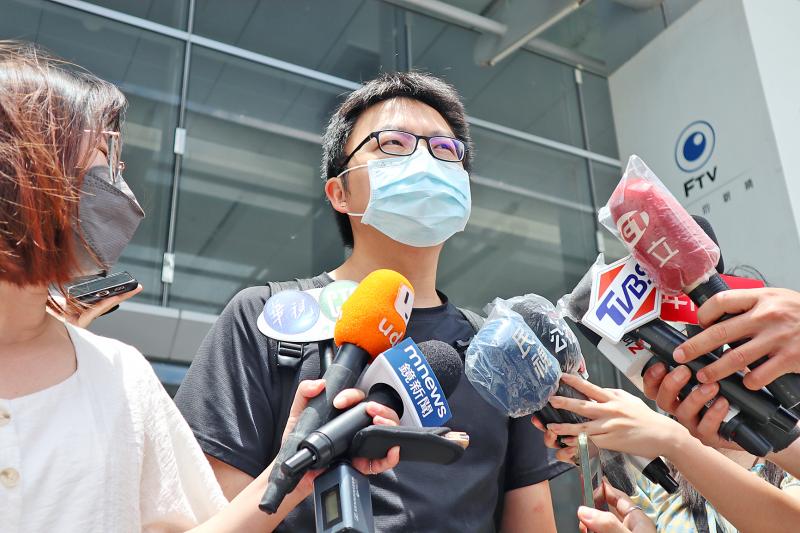The Central Epidemic Command Center (CECC) yesterday said its “1922” hotline does not have the authority to dispatch ambulances or disease prevention vehicles, after the father of a two-year-old who died of COVID-19 said the hotline took too long to respond to his call for help.
The two-year-old boy, nicknamed En En (恩恩), began showing symptoms on April 13, was diagnosed with COVID-19 and admitted to an intensive care unit the next evening. He died of septic shock and brainstem encephalitis induced by COVID-19 on April 19.
He was the nation’s first case of a child dying from COVID-19 complications.

Photo: Chou Hsiang-yun, Taipei Times
His father has since last week been asking the CECC and the New Taipei City Government why it took 81 minutes to find an ambulance to take his son to hospital.
En En’s father on Monday was allowed to visit the New Taipei City Fire Department to listen to the audio recording of the 119 telephone calls between his wife and the department on April 14.
However, a netizen claiming to be a former firefighter at the department on Tuesday wrote that department officials on Monday morning asked its staff to pretend that they were making and receiving emergency calls, and turned the volume up when En En’s father visited the department.
The department on Tuesday evening said the scenario was meant to simulate the actual situation on April 14 for En En’s father to understand how it was busier than usual that evening.
En En’s father yesterday said that he had made two calls to the CECC’s 1922 hotline on the same day — the first at 5:38pm and the second at 6:08pm — to say that his son had lost consciousness.
The case was transferred to the Centers for Disease Control’s (CDC) Northern Regional Center at 8:44pm, and the center took another 12 minutes to contact the New Taipei City Department of Health, he said.
En En’s father said it was “unacceptable” that it took 143 minutes — from when the second call ended at 6:21pm to when it contacted the regional center at 8:44pm — for the case to be transferred.
He showed a formal letter sent by the CDC on Wednesday last week, in response to his request for the hotline’s records of handling his son’s case, which showed that the hotline operator had suggested that he continue calling 119 or the local health department, and that as the case involved the need for medical assistance, it was transferred to the regional center.
The CECC yesterday issued a news release saying that its 1922 hotline’s duties include consultation services about disease control, quarantine, vaccination, isolation, testing and infectious disease information, but it does not have the authority to dispatch ambulances or disease prevention vehicles.
It said the hotline operator would tell the caller how to handle the situation when it receives such calls and later follow up on the case, and that the boy’s family had been informed about the procedures.
Additional reporting by CNA

Eight restaurants in Taiwan yesterday secured a one-star rating from the Michelin Guide Taiwan for the first time, while three one-star restaurants from last year’s edition were promoted to two stars. Forty-three restaurants were awarded one star this year, including 34 in Taipei, five in Taichung and four in Kaohsiung. Hosu (好嶼), Chuan Ya (川雅), Sushi Kajin (鮨嘉仁), aMaze (心宴), La Vie by Thomas Buhner, Yuan Yi (元一) and Frassi in Taipei and Front House (方蒔) in Kaohsiung received a one-star rating for the first time. Hosu is known for innovative Taiwanese dishes, while Chuan Ya serves Sichuan cuisine and aMaze specializes

Taitung County is to launch charter flights to Malaysia at the end of this year, after setting up flights to Vietnam and Thailand, the Taitung County Government said yesterday. The new charter flight services, provided by low-cost carrier Batik Air Malaysia, would be part of five-day tour packages for visits to Taitung County or Malaysia. The Batik Air charter flight, with about 200 seats, would take Malaysian tourists to Taitung on Dec. 30 and then at 12:35pm return to Kuala Lumpur with Taiwanese tourists. Another charter flight would bring the Taiwanese home on Jan. 3 next year, arriving at 5:30pm, before taking the

Taiwan High Speed Rail Corp. (THSRC) plans to ease strained capacity during peak hours by introducing new fare rules restricting passengers traveling without reserved seats in 2026, company Chairman Shih Che (史哲) said Wednesday. THSRC needs to tackle its capacity issue because there have been several occasions where passengers holding tickets with reserved seats did not make it onto their train in stations packed with individuals traveling without a reserved seat, Shih told reporters in a joint interview in Taipei. Non-reserved seats allow travelers maximum flexibility, but it has led to issues relating to quality of service and safety concerns, especially during

An exhibition celebrating Taiwan and Japan’s comic culture opened on Saturday in Taichung, featuring a section that explores Taiwanese reproductions of Japanese comics from when martial law limited Japanese representation. “A Century of Manga Culture: An Encounter of Taiwan and Japan’s Youth” held its Taiwan opening ceremony at Taichung’s National Taiwan Museum of Comics after an initial one-month run in Japan’s Kyoto International Manga Museum between May 24 and June 24. Much like the Kyoto exhibition, the show mainly celebrates the comic connection between Taiwan and Japan through late Taiwanese comic book